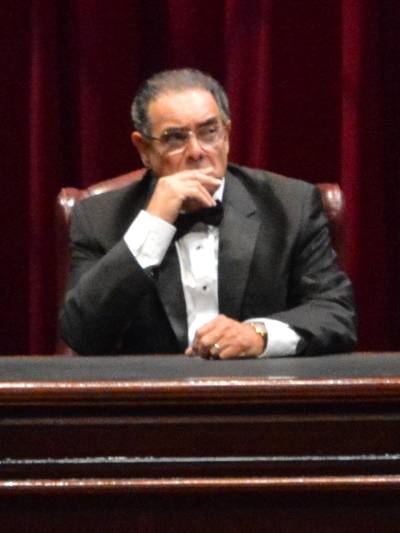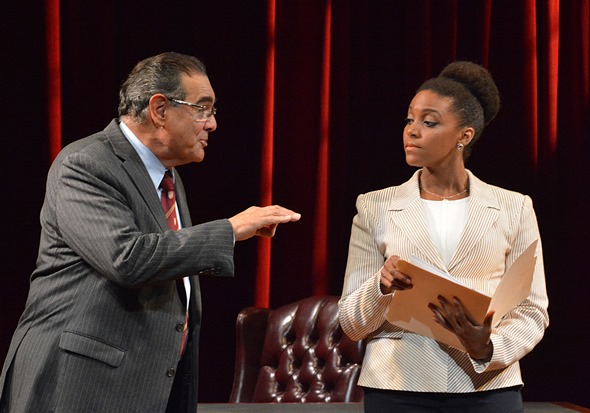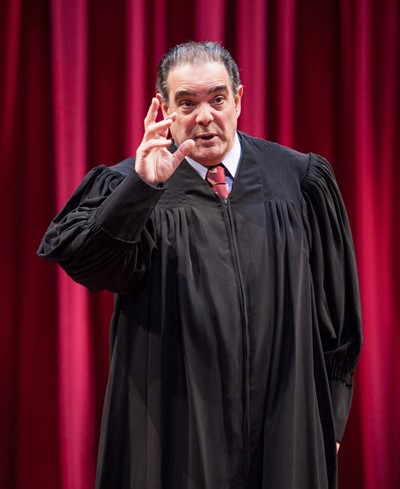‘The Originalist’ at Court: High court’s Scalia, lion who loves a fight, spars with spunky clerk
Review: “The Originalist” by John Strand, directed by Molly Smith at Court Theatre through June 10. ★★
By Lawrence B. Johnson
Everything about John Strand’s play “The Originalist,” a philosophical profile of the conservative Supreme Court Justice Antonin Scalia now on the boards at Court Theatre, recommends the enterprise as a one-man show. The positive side of that is Edward Gero’s expansive, assured and piquant performance as Scalia. On the shadowed side of “everything” I mean, well, everything else about this contrived and tormented attempt to turn what is essentially fascinating and funny stand-up into high drama.
Scalia, a brilliant man with a wicked sense of humor, must have been a hoot to be around and quite a challenge to contend with. His position papers were famous for their sharp and often acerbic wit. Hardly less remarked upon was the friendship between this bulwark of conservatism and his liberal arch foe on the Supreme Court, Ruth Bader Ginsberg.
With absolute surety, Scalia styled himself a modern guardian of the Constitution as it was inscribed – emblazoned perhaps, or still better chiseled – by its authors. He insisted that its truths were not only self-evident but immutable, that the document was not a living, evolving organism adaptable to the times but, literally, a dead text philosophically immured against interpretation by the latest generation of its beneficiaries. It is what it is, says what it says. Nothing could be clearer. End of story.
That, in Scalia’s mind, made him an originalist. It’s a blatantly arbitrary and self-justifying concept: My reading of the Constitution is authentic, and to the degree that you presume to disagree with me, you reveal yourself as that dangerous species, the activist. The younger George Bush during his presidency regularly complained about “activist judges.”
 To put it very mildly, Gero’s headstrong and defiant Scalia is full of himself, and quite amusing for it. He can think of only two occasions in his life in jurisprudence when he was wrong, and one of those was back in law school at Georgetown University, so that one doesn’t really count. He loves a challenge, revels in an all-out legalistic street fight.
To put it very mildly, Gero’s headstrong and defiant Scalia is full of himself, and quite amusing for it. He can think of only two occasions in his life in jurisprudence when he was wrong, and one of those was back in law school at Georgetown University, so that one doesn’t really count. He loves a challenge, revels in an all-out legalistic street fight.
Gero is marvelous as the quick, slashing, super-confident debater. And he’s a delightful raconteur, even if his ruminations are mostly about his own triumphs. He commands the stage from the start, when he’s addressing an unseen audience. That’s where we meet his interlocutor, or perhaps the straight man in the vaudeville banter that forms Strand’s play: a young African American woman who goes by the name of Cat, just out of Harvard Law.
Cat, played by Jade Wheeler with all the brazen presumption the part requires, interrupts Scalia’s speech to hold forth on some points that run counter to his legal view. He is annoyed. But this is a man who thrives on head-butting, so he receives Cat the next day in his chambers as a candidate to become his law clerk.
While Scalia raises an eyebrow here and there at Cat’s display of chutzpah in this job interview, her combination of nerve and smarts wins him over. She lands the position. OK, but I don’t entirely buy the idea of this kid getting in the face of a Supreme Court Justice, who smiles appreciatively at her gall and arrogance and (we might infer) sees himself in her.
 Cat in her new post becomes Scalia’s sparring partner. She attacks him with a will. He reminds her more than once that she has crossed a line of respect and deference. No kidding. But he loves it. The truth is, the part of Cat is a tough role to make credible in this mouse vs. lion face-off, and for all her bold posturing, Wheeler often seemed to be pacing through her speeches rather than speaking from a vulnerable heart.
Cat in her new post becomes Scalia’s sparring partner. She attacks him with a will. He reminds her more than once that she has crossed a line of respect and deference. No kidding. But he loves it. The truth is, the part of Cat is a tough role to make credible in this mouse vs. lion face-off, and for all her bold posturing, Wheeler often seemed to be pacing through her speeches rather than speaking from a vulnerable heart.
There are two welcome, not to say merciful, timeouts from the debates in chambers. When Scalia and Cat begin to wrangle over the Second Amendment, he asks her if she’s ever even held a gun. Well, no. So he takes her to a shooting range, where she hefts a high-powered rifle and lets him teach her how to shoot it. The experience doesn’t turn Cat’s head, but she does get into it, and it feels real.
The other excursion onto a human plane touches on the death of Cat’s father. Scalia attends the funeral and offers the young woman his fatherly solace.
 But those moments of legitimate drama are offset by the incursion of Brad, Cat’s former classmate and a zealous right-winger who comes in to help with the research for Scalia’s opposition to gay marriage, an issue before the Supreme Court. Brad (Brett Mack) is intrigued that a dyed-in-the-wool liberal like Cat, who has a personal stake in the outcome, would be helping the conservative justice. Then he pitches her to come over to the conservative side. The sky would be the limit, the world her oyster. Much like this scene, the character Brad is unneeded. He’s little more than a straw man, a nattering fool to be dismissed by both of those intellectual giants, their opposing minds notwithstanding.
But those moments of legitimate drama are offset by the incursion of Brad, Cat’s former classmate and a zealous right-winger who comes in to help with the research for Scalia’s opposition to gay marriage, an issue before the Supreme Court. Brad (Brett Mack) is intrigued that a dyed-in-the-wool liberal like Cat, who has a personal stake in the outcome, would be helping the conservative justice. Then he pitches her to come over to the conservative side. The sky would be the limit, the world her oyster. Much like this scene, the character Brad is unneeded. He’s little more than a straw man, a nattering fool to be dismissed by both of those intellectual giants, their opposing minds notwithstanding.
Which brings me back to my original proposition: Gero’s finely crafted Scalia would be better served without any of these trappings. Did I mention he’s an opera lover, and a devout Catholic? He first walks into view immersed in music from Verdi’s “La traviata.” The best line in the play comes in response to Mozart’s Mass in C minor, heard in the background. To Cat, a fallen Catholic, Scalia observes: We cannot see heaven, but in Mozart’s music we can hear it. For another fleeting moment, we glimpse the light of drama.
Related Link:
- Performance location, dates and times: Details at TheatreInChicago.com
Tags: Antonin Scalia, Court Theatre, Edward Gero, Jade Wheeler, John Strand, The Originalist



